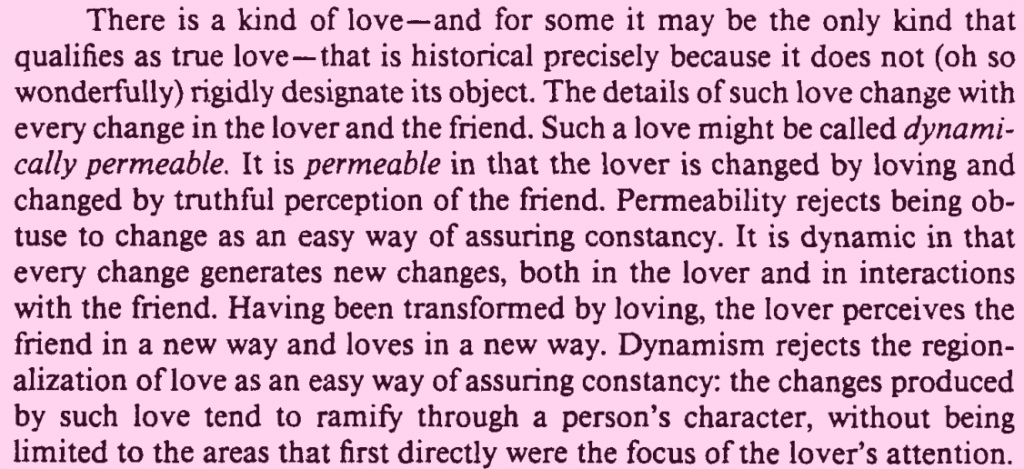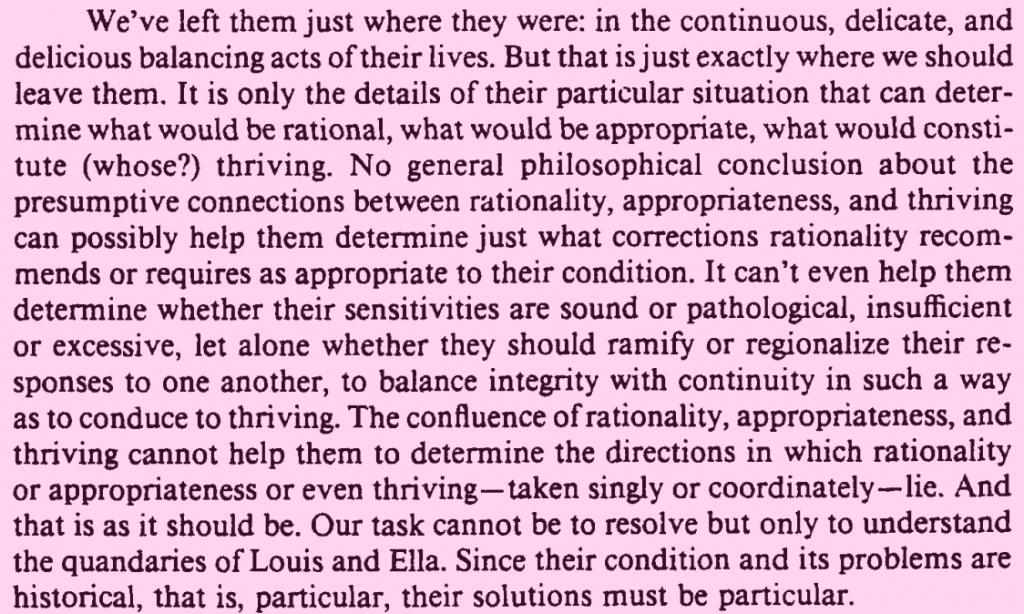Beloved Philosophical Writings on Love
What philosophical writing about love would you have us read?

The above is a passage from “The Historicity of Psychological Attitudes: Love Is Not Love Which Alters Not When It Alteration Finds” by Amélie Oksenberg Rorty, which appeared in Midwest Studies in Philosophy in 1986. It explores the ways in which love and change are related, and how an appreciation of that makes a loving relationship difficult to understand absent an awareness of the particular history of the changes it has wrought on those in it. The essay looks at an imaginary couple, Louis and Ella, and at its end, Rorty writes:

Happy Valentine’s Day, philosofriends. If you’re up for it, in the comments, suggest a philosophical work on love you’d recommend we check out.



CS Lewis’ Four Loves – not a very surprising suggestion, but I still find it useful.
Nietzsche, Gay Science 334:
One must Learn to Love. This is our experience in music: we must first learn in general to hear, to hear fully, and to distinguish a theme or a melody, we have to isolate and limit it as a life by itself; then we need to exercise effort and good-will in order to endure it in spite of its strangeness we need patience towards its aspect and expression and indulgence towards what is odd in it: – in the end there comes a moment when we are accustomed to it, when we expect it, when it dawns upon us that we should miss it if it were lacking; and then it goes on to exercise its spell and charm more and more, and does not cease until we have become its humble and enraptured lovers, who want it and want it again, and ask for nothing better from the world. – It is thus with us, however, not only in music: it is precisely thus that we have learned to love everything that we love. We are always finally recompensed for our good-will, our patience, reasonableness and gentleness towards what is unfamiliar, by the unfamiliar slowly throwing off its veil and presenting itself to us as a new, ineffable beauty: – that is its thanks for our hospitality. He also who loves himself must have learned it in this way: there is no other way. Love also has to be learned.
Skye Cleary, “Existentialism and Romantic Love”
The art of loving – Erich Fromm
The Erotic Phenomenon, Jean-Luc Marion.
“In effect, it is not enough for me to be in order to remain the one that I am: it is also, first and foremost, necessary for me that someone love me… For to give up on even the possibility that someone loves me would be like operating a transcendental castration upon myself, it would bring me down to the rank of an artificial intelligence, mechanical calculator or a demon, in short very likely lower than an animal, who can still mimic love, at least to our eyes. And in fact, those of my likeness who have given up – in part and only in a certain respect, it is true – on the possibility that someone loves them have, in proportion, lost their humanity. To give up on asking (oneself) the question “does anybody love me?” or above all to give up on the possibility of a positive response implies nothing less than giving up on the human itself.“
“Love is the perception of individuals. Love is the extremely difficult realisation that something other than oneself is real. Love, and so art and morals, is the discovery of reality.” – Iris Murdoch, “The Sublime and the Good”
Plato’s Symposium is widely regarded as a foundational work for the understanding of love, but it doesn’t seem to be well understood by recent commentators. Nygren, Vlastos, and Nussbaum charged Plato’s Diotima with making love self-centered, and I’m not aware of a fully convincing response to their charge, other than my own, in Chapter 7 of my Philosophical Mysticism in Plato, Hegel, and the Present (Bloomsbury, 2020). In which I show how Diotima can be understood as describing the lover’s nurturing of (rational) autonomy in the beloved, so that the lover is “reproduced” (207a) not by being copied (which certainly would seem to be a self-centered project), but by facilitating the birth of autonomy in the beloved (which is anything but a self-centered project, but does “reproduce” what is most essential in the lover). In this way, Plato illuminates the paradoxically intimate relationship between freedom and love.
See also Nora Kreft on Love and Autonomy in the Oxford handbook of philosophy of love.
Vladimir Solovyov, from The Meaning of Love:
…The matter of true love is above all based on faith. The root meaning of love, as has already been shown, consists in the acknowledgment of absolute significance for another being. But this being in its empirical being, as the subject of real sensuous perception, does not have absolute significance: it is imperfect in its worth and transient as to its existence. Consequently, we can assert absolute significance for it only by faith, which is the assurance of things hoped for, the conviction of things not seen. But to what does faith relate in the present instance? What does it strictly mean to believe in the absolute, and, what is the same thing, everlasting significance of this individual person? To assert that he himself, as such, in his particularity and separateness, possesses absolute significance would be as absurd as it is blasphemous. Of course the word “worship” is very generally used in the sphere of amorous relations, but then the word “madness” likewise possesses its legitimate application in this domain. So then, observing the law of logic, which does not allow us to admit contradictory definitions, and likewise obeying the command of true religion, which forbids the worship of idols, we must, by faith in the object of our love, understand the affirmation of this object as it exists in God, and as in this sense possessing everlasting significance. It must be understood that this transcendental relation to one’s other, this mental transference of it into the sphere of the Divine, presupposes the same relation to oneself, the same transference and affirmation of oneself in the sphere of the absolute. I can only acknowledge the absolute significance of a given person, or believe in him (without which true love is impossible), by affirming him in God, and consequently by belief in God Himself, and in myself, as possessing in God the center and root of my own existence. This triune faith is already a certain internal act, and by this act is laid the first basis of a true union of the man with his other and the restoration in it (or in them) of the image of the triune God. The act of faith, under the real conditions of time and place, is a prayer (in the basic, not in the technical sense of the “word). The indivisible union of oneself and another in this relation is the first step towards a real union. In itself this step is small, but without it nothing more advanced or greater is possible.
Seeing that for God, the eternal and indivisible, all is together and at once, all is in one, then to affirm any individual being whatsoever in God signifies to affirm him not in his separateness but in the all, or more accurately—in the unity of the all. But seeing that this individual being, in his given reality, does not enter into the unity of the all, but exists separately as an individualized material phenomenon, then the object of our believing love is necessarily to be distinguished from the empirical object of our instinctive love, though it is also inseparably bound up with it. It is one and the same person in two distinguishable aspects, or in two different spheres of being—the ideal and the real. The first is as yet only an idea. By steadfast, believing and insightful love, however, we know that this idea is not an arbitrary fiction of our own, but that it expresses the truth of the object, only a truth as yet not realized in the sphere of external, real phenomena.
This true idea of the beloved object, though it shines through the real phenomenon in the instant of love’s intense emotion, is at first manifested in a clearer aspect only as the object of imagination. The concrete form of this imagination, the ideal image in which I clothe the beloved person at the given moment, is of course created by me, but it is not created out of nothing. And the subjectivity of this image as such, i.e., as it manifests itself here and now before the eyes of my soul, by no means proves that it is subjective, i.e., a characteristic of an imaginary object which exists for me alone. If for me, who am myself on this side of the transcendental world, a certain ideal object appears to be only the product of my own imagination, this does not interfere with its full reality in another higher sphere of being. And though our real life is outside this higher sphere, yet our mind is not wholly alien to it, and we can possess a certain abstract comprehension of the laws of its being. And here is the first and basic law: If in our world separate and isolated existence is a fact and an actuality, while unity is only a concept and an idea, then in the higher sphere, on the contrary, reality appertains to the unity, or more accurately, to the unity-of-the-all, while separateness and individualization exist only potentially and subjectively.”
…the experience of faith. This latter is incomparably more difficult than the former, for it is dependent more on internal action than on reception from without. Only by consistent acts of conscious faith do we enter into real correspondence with the realm of the truly-existent, and through it into true correlation with our “other.” Only on this basis can we retain and strengthen in consciousness that absoluteness for us of another person (and consequently also the absoluteness of our union with him) which is immediately and unaccountably revealed in the intense emotion of love, for this emotion of love comes and passes away, but the faith of love abides.”
…
Love is important not as one of our feelings, but as the transfer of all our interest in life from ourselves to another, as the shifting of the very center of our personal lives.
Matt Groening — ‘Love is a snowmobile racing across the tundra and then suddenly it flips over, pinning you underneath. At night, the ice weasels come.’
From our greatest living aphorist: “Love is not something you can put chains on and throw into a lake. That’s called Houdini. Love is liking someone a lot.”
Two from C.D. Broad’s Examination of McTaggart’s Philosophy:
“Love is, in some respect, so sublime, and, in others, so ridiculous, and the two aspects are so closely intertwined, that it is not easy to keep a just mean between cheap cynicism and muddled mysticism.”
I fear some contemporary writing on love misses the mean in the second of Broad’s ways.
But then he also wrote, in a passage with some similarities to the Amelie Rorty:
“If we may compare prolonged and successful sexual love for a person to the course of a river from its source to the sea, it begins as a violent torrent in a narrow bed full of rocks and shallows, in its middle reaches it receives many tributaries, and in its later stages it becomes a calm wide deep stream … Too often, of course, there is no such happy ending, and the stream peters out into the shallows of mere habitual toleration or the swamps of mutual irritation and frustration.”
Martin Buber, I and Thou
Monique Wonderly’s “Love and Attachment” is an excellent critical examination of the idea that love must centrally involve disinterested concern for the beloved.
Nothing surpasses Plato’s Phaedrus.
Kierkegaard, Works of Love
I don’t know if I’m allowed to cite my own work, but if you want to read about ‘love as hysteresis’ (no relation to ‘hysteria’, in some ways almost its opposite), check out my essay “What is Love?” from a Valentine’s Day a dozen years ago. http://netsettlement.blogspot.com/2011/02/what-is-love.html
(Some good stuff in this thread so I thought to select something a bit different if not surprising.)
A fundamental premise of Freudian psychoanalysis is the value of individuation, which it aims to promote. Cf. this quote from Jonathan Lear’s Love and Its Place in Nature: A Philosophical Interpretation of Freudian Psychoanalysis (Farrar, Straus & Giroux, 1990): “Psychoanalysis, Freud once said, is a cure through love. On the manifest level, Freud meant that psychoanalytic therapy requires the analysand’s emotional engagement with the analyst and the analyst’s empathic understanding of his patient. But the latent content of this remark, which Freud only gradually discovered, and then through a glass darkly, is that psychoanalysis in its essence promotes individuation. In that sense, psychoanalysis is itself a manifestation of love. And the emergence of psychoanalysis onto the human scene must, from this perspective, be part of love’s developmental history.”
As for Freud’s views on the Judeo-Christian “love commandment,” those have to do with a “popular—and psychologically insidious—understanding of the love commandment, and thus its culturally significant reality, quite aside from how the imperative of universal love might be parsed in philosophical circles.” As Ernest Wallwork further explains, Freud’s critique here “does not extend to other-regarding behavior in general.” Indeed, “That Freud’s repudiation of the love commandment is actually a reinterpretation of it along more modest lines is indicated by his explicit embrace of an ethic of universal love. Four years before his harsh indictment of the love commandment in Civilization and its Discontents, Freud wrote to Romain Rolland, whose broad humanism he respected, that ‘I myself have always advocated love of mankind not out of sentimentality or idealism, but for sober, economic reasons: because in the face of our instinctual drives and the world as it is I was compelled to consider this love as indispensable for the preservation of the human species as, say, technology.’” In 1933 Freud spoke of love as necessary for “harnessing the life instincts, or Eros, against man’s propensity for cruelty and war. “… ’There is no need for psycho-analysis to be ashamed to speak of love in this connection, for religion itself uses the same words, “Thou shalt love thy neighbour as thyself.”’ But ever the realist, Freud adds, ‘This, however, is more easily said than done.’” See Ernest Wallwork’s Psychoanalysis and Ethics (Yale University Press, 1991).
I always found the tenor of Freud’s pessimism to match mine but nonetheless, his general foundational insights into the human psyche never fail to be understated. He will always have a place in my heart. I have always enjoyed rereading Wendy Brown’s work, Mourning and Melancholy which, is more implicitly a bid at understanding the drive to recover the (never possessed) maternal object but can be transposed onto a framework of love, such that when a loved one is lost, a fragment of our substantial being is recanted, rendering us disenfranchised doubly.
The verse translation of Alcibiades’s speech by Anne Carson, https://www.lrb.co.uk/the-paper/v42/n22/anne-carson/oh-what-a-night-alkibiades
Thomas Smith’s essay “Romantic Love” does an interesting job trying to make a hybrid account combining elements of Harry Frankfurt’s view on the matter as represented in his book The Reasons of Love, and Robert Nozick’s view on the matter as represented in his book The Examined Life.
I wrote a really weird paper on love.
Here is the essay, a cheat sheet, and some media (podcasts etc) about it:
https://www.georgigardiner.com/we-forge-the-conditions-of-love
It’s not about what love is. Maybe that project would feel too arrogant for me to tackle.
It’s about what people think love is. Conceptions of love affect self-ascriptions. And self-ascriptions can be powerful.
I explore how the meaning of “love” is permissive. I look at what shapes conceptions of love and sexuality.
Then I suggest that maybe we should have conceptions that aim towards a more queer — less heterosexual — society, over generations.
And I explore ideas about “limerence”, which is obsessive romantic infatuation. I understand it as an attentional addiction. I look at how people discuss limerence, in contrast to love.
It’s a weird paper. But it resonates with people. It is *by far* my favourite paper I have ever written. It must be full of mistakes, because it is just so wild.
https://m.youtube.com/watch?v=O6Ad4qdkUU8
I think love is not philosophy. Please make attention to remark subjects, the border is sensible today.
Gregory Bateson and Douglas Hoffstadter sent me on a journey.